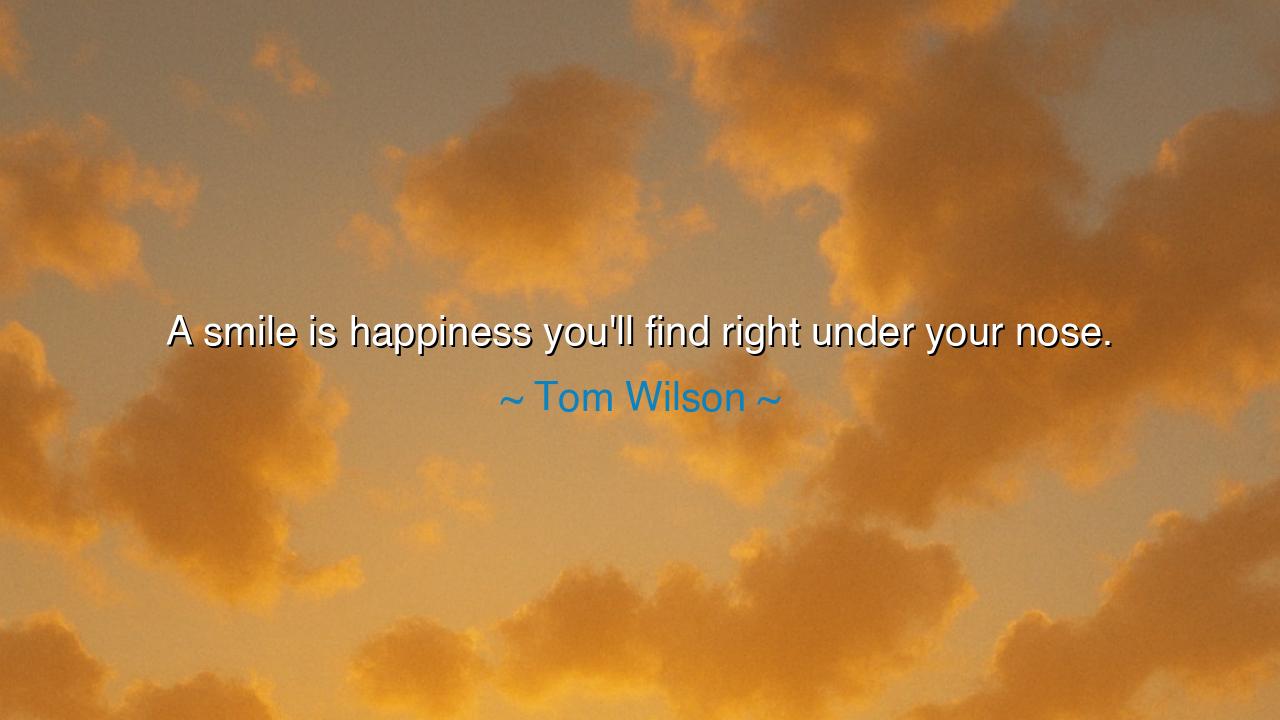
A smile is happiness you'll find right under your nose.






“A smile is happiness you'll find right under your nose.” — Thus spoke Tom Wilson, the quiet humorist and creator of Ziggy, whose words, though lighthearted in tone, carry the depth of a philosopher’s wisdom. In this simple line, he hides a profound truth about the nature of happiness: that it is not distant, hidden in the heavens, nor buried in gold or fame, but resting always close at hand — right under your nose, within the humble gesture of a smile. It is the reminder of the ages: that joy is not something we must seek in the far reaches of the world, but something we can awaken from within ourselves, with the smallest act of grace.
A smile, in its simplicity, is the most ancient language of the heart. Long before words, before empires and crowns, men and women looked into one another’s eyes and smiled — and peace was born. It is the bridge that crosses loneliness, the spark that melts the frost of fear. When Wilson calls it “happiness under your nose,” he reminds us that we often spend our lives searching for joy in distant dreams, forgetting the power we carry upon our own faces. The universe has hidden the secret of contentment not in riches, but in the most common of gestures — the one we can give freely, and lose nothing by giving.
The origin of this quote lies in Wilson’s view of life as both absurd and beautiful — a dance of small struggles and quiet blessings. Through his art, he captured the gentle humor of human existence, showing that joy is not the absence of difficulty but the decision to meet it with lightness. To smile, even in adversity, is to reclaim sovereignty over one’s spirit. It is to say, “The world may trouble me, but it will not conquer me.” The ancients knew this too: stoic philosophers taught that we cannot control events, only our response to them. A smile, then, is not mere cheerfulness; it is courage made visible.
Consider the story of Anne Frank, the young girl who hid from tyranny in a small attic, surrounded by fear and darkness. Yet in her diary she wrote, “Whoever is happy will make others happy too.” And she smiled — in drawings, in words, in spirit — though the world around her offered little reason. Her smile was not one of denial, but of defiance — a gentle torch held against overwhelming night. Through her, we see the power of Wilson’s truth: that happiness, even when the world tries to strip it away, can still be found “right under your nose,” if only the heart remembers how to smile.
There is a sacred paradox in this teaching. The more we chase happiness, the more it eludes us; but when we stop, when we breathe, when we smile at the moment as it is — imperfect, fleeting, alive — happiness reveals itself. The smile becomes both symbol and practice: the body’s way of reminding the soul that it is still capable of joy. Science confirms what wisdom long knew — that the simple act of smiling releases the very chemistry of calm and warmth within us. Thus, the path to peace may not lie in conquering the world, but in softening our own expression toward it.
A smile, then, is not a decoration of the face but an offering of the heart. It is a small act of creation, for in it we make the world gentler, more human. When one person smiles at another, something ancient stirs — a shared recognition that beneath all masks and divisions, we belong to the same fragile, luminous story. One smile can disarm anger, mend silence, or begin love. Even when given to no one, a smile to oneself is an act of mercy — a way of saying, “I forgive, I endure, I still believe.”
The lesson is as simple as it is profound: do not look too far for happiness. It dwells not in the distant hills, but in the breath you take, the kindness you give, the smile you wear. Each morning, before you begin your labors, remember that joy is a choice — not a reward. Practice smiling not as a mask, but as a declaration that life, for all its sorrows, remains worth living. When days are heavy, let your smile be an act of rebellion; when they are light, let it be your gratitude made visible.
So, my child of the future, carry this truth with you: happiness lives close — closer than thought, closer than dream — right under your nose. Do not wait for the world to change before you smile; smile, and you will change the world around you. For every time you lift the corners of your mouth, you lift the weight of the human heart. And in that simple gesture, fleeting yet eternal, you will find the purest wisdom of all — that joy, like the dawn, begins not in the sky, but in the face that dares to greet the day.






AAdministratorAdministrator
Welcome, honored guests. Please leave a comment, we will respond soon